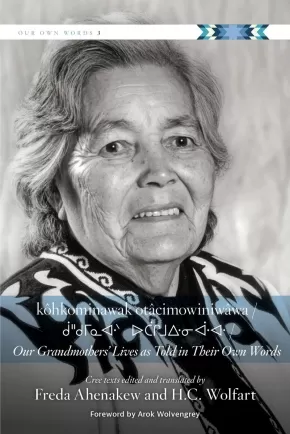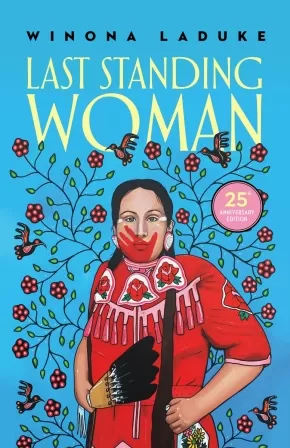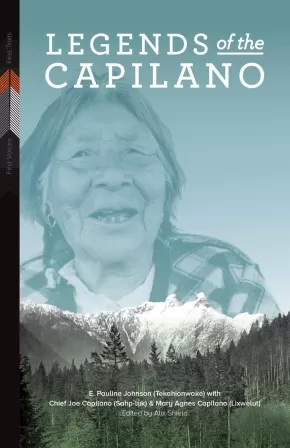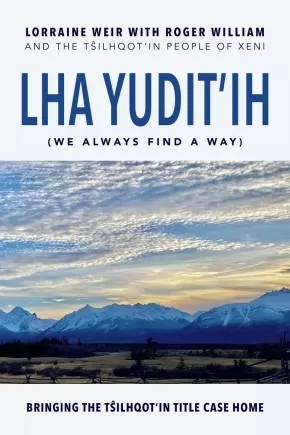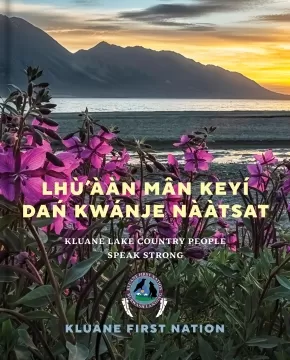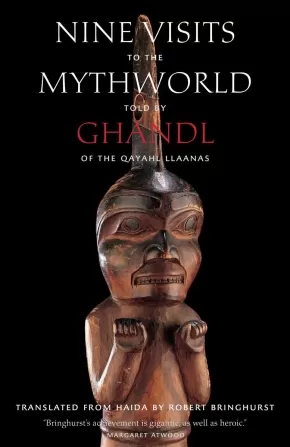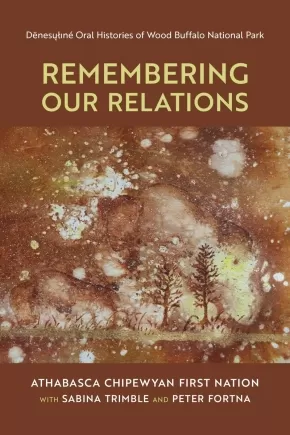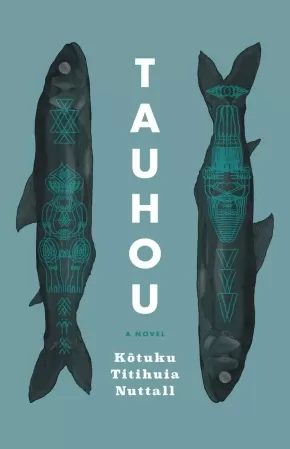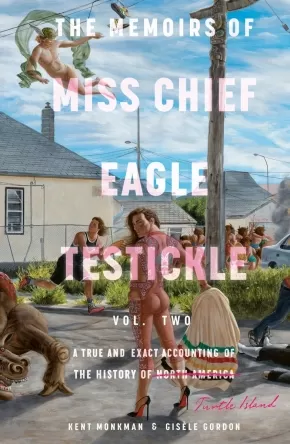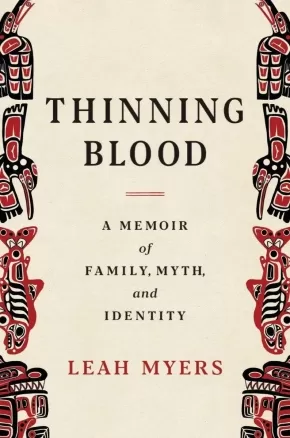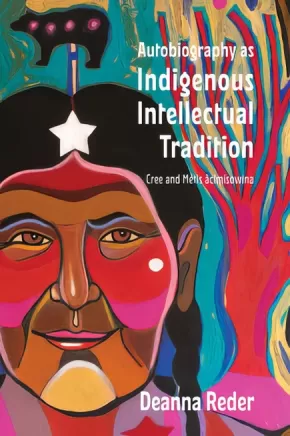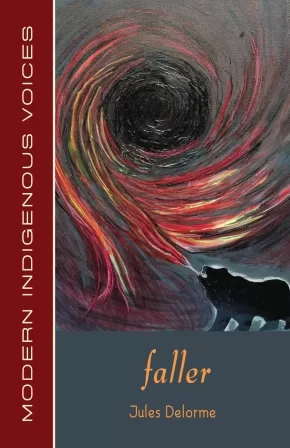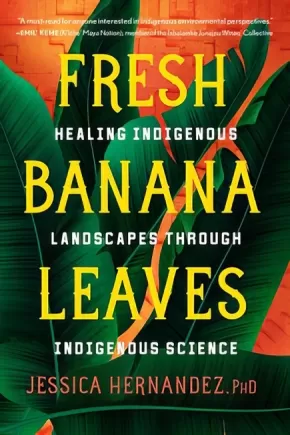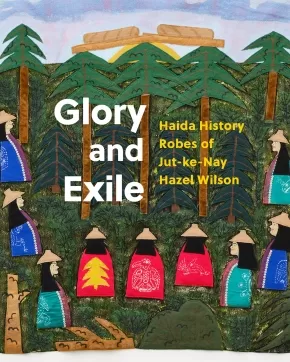
Indigenous Stories
16
-
30
of
100 Results;
Sort By
Go To
of 7
kôhkominawak otâcimowiniwâwa / Our Grandmothers’ Lives As Told in Their Own Words
$29.95
Format:
Paperback
Text Content Territories:
Indigenous Canadian; First Nations; Cree (Nehiyawak);
Reading Level: N/A
ISBN / Barcode: 9780889779495
Synopsis:
Synopsis:
The 25th anniversary of a historically significant collection, presented in Cree and English.
kôhkominawak otâcimowiniwâwa / Our Grandmothers’ Lives is a collection of reminiscences and personal stories from the daily lives of seven Cree women over the past century, presented here in Cree and English. Recorded in their own language, these women share their memories of their lives and the history of their peoples, describing activities such as household chores, snaring rabbits and picking berries, going to school, marriage, bearing and raising children, and providing insights into the traditional teachings of a society in which the practical and spiritual are never far apart.
Reviews
"[T]hese ... are good stories to share ... and are absolute treasures." —Chelsea Vowel, author of Buffalo is the New Buffalo
Educator & Series Information
This book is part of the Our Own Words series.
Presented in Cree and English.
Additional Information
418 pages | 6.00" x 9.00" | Paperback
Last Standing Woman
$23.95
Format:
Paperback
Text Content Territories:
Indigenous American; Native American; Anishinaabeg; Ojibwe (Chippewa); Minnesota Chippewa Tribe; White Earth Band of Ojibwe;
Reading Level: N/A
ISBN / Barcode: 9781774920527
Synopsis:
Synopsis:
Hopeful, irreverent, and deeply moving, Winona LaDuke’s Last Standing Woman chronicles the stories and struggles of an Anishinaabe community across seven generations.
Born at the turn of the 21st century, The Storyteller, also known as Ishkwegaabawiikwe (Last Standing Woman), carries her people’s past within her memories. The White Earth Anishinaabe people have lived on the same land since time immemorial. Among the towering white pines and rolling hills, each generation is born, lives out their lives, and is buried.
The arrival of European missionaries changes the community forever. Piece by piece, government policies rob the people of their land. Missionaries and Indian agents work to outlaw ceremonies the Anishinaabeg have practised for centuries. Grave-robbing anthropologists dig up ancestors and whisk them away to museums as artifacts. Logging operations destroy traditional sources of food, pushing the White Earth people to the brink of starvation.
Battling addiction, violence, and corruption, each member of White Earth must find their own path of resistance as they struggle to reclaim stewardship of their land, bring their ancestors home, and stay connected to their culture and to each other.
In this highly anticipated 25th anniversary edition of her debut novel, Winona LaDuke weaves a nonlinear narrative of struggle and triumph, resistance and resilience, spanning seven generations from the 1800s to the early 2000s.
Reviews
"Humor and compassion are ever present, and at its best, Last Standing Woman is a dignified and powerful retelling of one reservation's struggle for survival."— Booklist, quote from review of previous edition
"Rooted in LaDuke's own Anishinaabe heritage, the novel skillfully intertwines social history, oral myth and character study in ways reminiscent of Leslie Marmon Silko and Louise Erdrich." — Publishers Weekly, quote from review of previous edition
"LaDuke's characters are as vital and fully realized as any in a Louise Erdrich novel...Recommended for both public and academic libraries." — Library Journal, quote from review of previous edition
"The Anishinaabe culture leaps off the page and you can practically smell the fry bread cooking on the stove and hear the drums beating in the distance."— Book Snob, quote from review of previous edition
Additional Information
360 pages | 5.50" x 8.50" | Paperback | 25th Anniversary Edition
Legends of the Capilano
$24.95
Editors:
Format:
Paperback
Text Content Territories:
Indigenous Canadian; First Nations; Haudenosaunee (Iroquois); Kanyen'keha:ka (Mohawk); Salish; Coast Salish; Squamish;
Grade Levels: 12; University/College;
ISBN / Barcode: 9781772840179
Synopsis:
Synopsis:
Bringing the Legends home
Legends of the Capilano updates E. Pauline Johnson’s 1911 classic Legends of Vancouver, restoring Johnson’s intended title for the first time. This new edition celebrates the storytelling abilities of Johnson’s Skwxwú7mesh (Squamish) collaborators, Joe and Mary Capilano, and supplements the original fifteen legends with five additional stories narrated solely or in part by Mary Capilano, highlighting her previously overlooked contributions to the book.
Alongside photographs and biographical entries for E. Pauline Johnson, Joe Capilano, and Mary Capilano, editor Alix Shield provides a detailed publishing history of Legends since its first appearance in 1911. Interviews with literary scholar Rick Monture (Mohawk) and archaeologist Rudy Reimer (Skwxwú7mesh) further considers the legacy of Legends in both scholars’ home communities. Compiled in consultation with the Mathias family, the direct descendants of Joe and Mary Capilano and members of the Skwxwú7mesh Nation, this edition reframes, reconnects, and reclaims the stewardship of these stories.
Reviews
"Shield has skilfully opened up a new avenue to the past with potentially wide-ranging appeal both to scholars and students and to general readers."— Jean Barman
Educator Information
This book is part of the First Voices, First Texts series.
Additional Information
256 pages | 5.50" x 8.50" | Paperback
Lha yudit’ih (We Always Find a Way): Bringing the Tŝilhqot’in Title Case Home
$35.00
Format:
Paperback
Text Content Territories:
Indigenous Canadian; First Nations; Dene; Tsilhqot'in (Chilcotin);
Reading Level: N/A
ISBN / Barcode: 9781772013825
Synopsis:
Synopsis:
Eight years in the making, Lha yudit’ih (We Always Find a Way) is a community oral history of Tsilhqot’in Nation v. British Columbia, the first case in Canada to result in a declaration of Aboriginal Rights and Title to a specific piece of land. Told from the perspective of the Plaintiff, Chief Roger William, joined by fifty Xeni Gwet’ins, Tŝilhqot’ins, and allies, this book encompasses ancient stories of creation, modern stories of genocide through smallpox and residential school, and stories of resistance including the Tŝilhqot’in War, direct actions against logging and mining, and the twenty-five-year battle in Canadian courts to win recognition of what Tŝilhqot’ins never gave up and have always known. “We are the land,” as Chief Roger says. After the violence of colonialism, he understands the court case as “bringing our sight back.” This book witnesses the power of that vision, its continuity with the Tŝilhqot’in world before the arrival of colonizers two centuries ago, and its potential for a future of freedom and self-determination for the Tŝilhqot’in People.
Additional Information
480 pages | 6.49" x 9.48" | 32 page colour photograph insert and black and white photos and illustrations and maps throughout | Paperback
Lhù’ààn Mân Keyí Dań Kwánje Nààtsat: Kluane Lake Country People Speak Strong
$55.00
Format:
Hardcover
Text Content Territories:
Indigenous Canadian; First Nations; Tutchone; Southern Tutchone; Kluane First Nation;
Reading Level: N/A
ISBN / Barcode: 9781773272061
Synopsis:
Synopsis:
In this poignant display of the resilience of language, culture, and community in the face of the profound changes brought by settlers, Kluane First Nation Elders share stories from their lives, knowledge of their traditional territory (A si Keyi, "my grandfather's country"), and insights on the building of their self-governing First Nation.
With generosity, diligence and deep commitment to their community, Elders from Lhu'aan Man Keyi (Kluane First Nation) recorded oral histories about their lives in the southwest Yukon. They shared wisdom, stories and songs passed down from grandparents, aunties and uncles, in Dan k'e (Southern Tutchone, Kluane dialect) and English. This years-long project arose from the Elders' desire for their children and future generations to know the foundations of language, culture, skills and beliefs that will keep them proud, healthy and strong. The Elders speak of life before the Alaska Highway, when their grandparents drew on thousands of years of traditional knowledge to live on the land through seasonal rounds of hunting and gathering; the dark years after the building of the Alaska Highway, when children were taken away to residential schools and hunting grounds were removed to form the Kluane Game Preserve and National Park; and the decades since, when the community worked through the Yukon land claims process to establish today's self-governing First Nation.
Inclusivity is a key community value. The Elders' stories are accompanied by the voices of youth and citizens of all ages, along with a history of the Kluane region. The book is beautifully illustrated with Elders' photographs, historical images and art work, and photos showing breathtaking views of Kluane mountains, lakes, sites, trails, and activities in the community today. With passionate and deeply informed voices, this is a stirring portrait created by a community that has shown resilience through massive changes and remains dedicated to preserving their culture, language and lands for the generations to come.
Awards
- 2024 Indigenous History Book Prize
Educator Information
Some of the wisdom, stories, and songs are in Dan k'e (Southern Tutchone, Kluane dialect).
Additional Information
384 pages | 11.25" x 9.00"| 150 colour and b&w photos | Hardcover
Nine Visits to the Mythworld: Told by Ghandl of the Qayahl Llaanas
$26.95
Format:
Paperback
Text Content Territories:
Indigenous Canadian; First Nations; Haida;
Reading Level: N/A
ISBN / Barcode: 9781771623773
Synopsis:
Synopsis:
In the Fall of 1900, a young American anthropologist named John Swanton arrived in the Haida country, on the Northwest Coast of North America, intending to learn everything he could about Haida mythology. He spent the next ten months phonetically transcribing several thousand pages of myths, stories, histories and songs in the Haida language. Swanton met a number of fine mythtellers during his year in the Haida country. Each had his own style and his own repertoire. Two of them—a blind man in his fifties by the name of Ghandl, and a septuagenarian named Skaay—were artists of extraordinary stature, revered in their own communities and admired ever since by the few specialists aware of their great legacy.
Nine Visits to the Mythworld includes all the finest works of one of these master mythtellers. In November 1900, when Ghandl dictated these nine stories, the Haida world lay in near ruins. Wave upon wave of smallpox and other diseases, rapacious commercial exploitation by fur traders, whalers and miners, and relentless missionization by the church had taken a huge toll on Haida culture. Yet in the blind poet’s mind, the great tradition lived, and in his voice it comes alive. Robert Bringhurst’s eloquent and vivid translations of these works are supplemented by explanatory notes that supply the needed background information.
Additional Information
224 pages | 5.50" x 8.50" | b&w photographs | Paperback
Remembering Our Relations: Dënesųłıné Oral Histories of Wood Buffalo National Park
$34.99
Format:
Paperback
Text Content Territories:
Indigenous Canadian; First Nations; Dene; Denesuline (Chipewyan);
Reading Level: N/A
ISBN / Barcode: 9781773854113
Synopsis:
Synopsis:
Elders and leaders remind us that telling and amplifying histories is key for healing. Remembering Our Relations is an ambitious collaborative oral history project that shares the story of Wood Buffalo National Park and the Dënesųłıné peoples it displaced.
Wood Buffalo National Park is located in the heart of Dënesųłıné homelands, where Dené people have lived from time immemorial. Central to the creation, expansion, and management of this park, Canada’s largest at nearly 45, 000 square kilometers, was the eviction of Dënesųłıné people from their home, the forced separation of Dene families, and restriction of their Treaty rights.
Remembering Our Relations tells the history of Wood Buffalo National Park from a Dene perspective and within the context of Treaty 8. Oral history and testimony from Dene Elders, knowledge-holders, leaders, and community members place Dënesųłıné voices first. With supporting archival research, this book demonstrates how the founding, expansion, and management of Wood Buffalo National Park fits into a wider pattern of promises broken by settler colonial governments managing land use throughout the twentieth and twenty-first centuries.
By prioritizing Dënesųłıné histories Remembering Our Relations deliberately challenges how Dene experiences have been erased, and how this erasure has been used to justify violence against Dënesųłıné homelands and people. Amplifying the voices and lives of the past, present, and future, Remembering Our Relations is a crucial step in the journey for healing and justice Dënesųłıné peoples have been pursuing for over a century.
Additional Information
352 pages | 6.00" x 9.00" | Paperback
Tauhou: A Novel
$24.99
Text Content Territories:
Indigenous Canadian; First Nations; Salish; Coast Salish; Saanich (WSANEC); Indigenous New Zealander; Maori; Ngati Tuwharetoa; Te Ati Awa;
Reading Level: N/A
ISBN / Barcode: 9781487011697
Synopsis:
Synopsis:
Dear grandmother, I am writing this song, over and over again, for you. I am a stranger in this place, he tauhou ahau, reintroducing myself to your land.
Tauhou is an inventive exploration of Indigenous families, womanhood, and alternate post-colonial realities by Kotuku Titihuia Nuttall, a writer of Maori and Coast Salish descent. This innovative hybrid novel envisions a shared past between two Indigenous cultures, set on reimagined versions of Vancouver Island and Aotearoa New Zealand that sit side by side in the ocean.
Each chapter is a fable, an autobiographical memory, a poem. A monster guards cultural objects in a museum, a woman uncovers her own grave, another woman remembers her estranged father. On rainforest beaches and grassy dunes, sisters and cousins contend with the ghosts of the past - all the way back to when the first foreign ships arrived on their shores.
In a testament to the resilience of Indigenous women, the two sides of this family, Coast Salish and Maori, must work together in understanding and forgiveness to heal that which has been forced upon them by colonialism. Tauhou is an ardent search for answers, for ways to live with truth. It is a longing for home, to return to the land and sea.
Reviews
"Tauhou is a search for answers, of finding ways to live with the truth. Some of the stories are like fables, others like poetry, and all are a sheer joy to read. A longing for home resonates, a gift for those of us searching for our island also."— Kete Books
"This one's for the lovers of language, lean prose-poetry you can dip in and out of and think about for hours. Best read beside a large body of water."— Woman Magazine
"Brilliantly written in the best of Maori and Coast Salish practices of story, Tauhou is teeming with possibility, love, and dreaming otherwise." — Leanne Betasamosake Simpson, author of Noopiming: The Cure for White Ladies
"Kotuku Titihuia Nuttall takes threads made from all the colours of the Indigenous experience and crosses them over oceans, cultures, and time." — Tayi Tibble, author of Poukahangatus and Rangikura
"Kotuku Titihuia Nuttall's Tauhou is a brilliant example of what language can do when forged with intentional hands and a fantastic mind. Nuttall's work binds words in a way that doesn't hold too tightly but steadfastly contains the many Ancestors present in Nuttall's life and work, weaving together a tapestry of nuance and witnessing. Masterful dialogue and rich scenes move emotions like the currents around Aotearoa and the Salish Seas, a beautiful display of lyricism that loudly proclaims that Kotuku Titihuia Nuttall belongs in the crescendo of rising voices in CanLit. Tauhou is not a collection to miss!" — jaye simpson, author of it was never going to be okay
"The stories in this collection move like the waves of the ocean that divide Vancouver Island and Aotearoa. Once you emerge from Tauhou's narrative depths, you'll miss its imagination, its rhythms, its heart." — Alicia Elliott, author of A Mind Spread Out on the Ground
Educator Information
Includes a SENĆOŦEN glossary, a Te Reo Māori glossary, an Author's Notes and Acknowledgements.
Curriculum Connections: Indigenous Studies
Additional Information
224 pages | 5.00" x 7.75" | Hardcover
The Memoirs of Miss Chief Eagle Testickle: Vol. 2: A True and Exact Accounting of the History of Turtle Island (HC) (3 in Stock)
$44.00
Format:
Hardcover
Text Content Territories:
Indigenous Canadian; First Nations; Cree (Nehiyawak);
Reading Level: N/A
ISBN / Barcode: 9780771006470
Synopsis:
Synopsis:
From global art superstar Kent Monkman and his longtime collaborator Gisèle Gordon, a transformational work of true stories and imagined history that will remake readers' understanding of the land called North America.
For decades, the singular and provocative paintings by Cree artist Kent Monkman have featured a recurring character—an alter ego of sorts, a shape-shifting, time-travelling elemental being named Miss Chief Eagle Testickle. Though we have glimpsed her across the years, and on countless canvases, it is finally time to hear her story, in her own words. And, in doing so, to hear the whole history of Turtle Island anew. The Memoirs of Miss Chief Eagle Testickle: A True and Exact Accounting of the History of Turtle Island is a genre-demolishing work of genius, the imagined history of a legendary figure through which a profound truths emerge—a deeply Cree and gloriously queer understanding of our shared world, its past, its present, and its possibilities.
Volume Two, which takes us from the moment of confederation to the present day, is a heartbreaking and intimate examination of the tragedies of the nineteenth and twentieth century. Zeroing in on the story of one family told across generations, Miss Chief bears witness to the genocidal forces and structures that dispossessed and attempted to erase Indigenous peoples. Featuring many figures pulled from history as well as new individuals created for this story, Volume Two explores the legacy of colonial violence in the children’s work camps (called residential schools by some), the Sixties Scoop, and the urban disconnection of contemporary life. Ultimately, it is a story of resilience and reconnection, and charts the beginnings of an Indigenous future that is deeply rooted in an experience of Indigenous history—a perspective Miss Chief, a millennia-old legendary being, can offer like none other.
Blending history, fiction, and memoir in bold new ways, The Memoirs of Miss Chief Eagle Testickle are unlike anything published before. And in their power to reshape our shared understanding, they promise to change the way we see everything that lies ahead.
Additional Information
264 pages | 6.79" x 10.26" | Hardcover
Thinning Blood: A Memoir of Family, Myth, and Identity (HC) (1 in Stock)
$34.95
Format:
Hardcover
Text Content Territories:
Indigenous American; Native American; Salish; Coast Salish; Klallam (Clallam); Jamestown S'Klallam;
Reading Level: N/A
ISBN / Barcode: 9781324036708
Synopsis:
Synopsis:
Named a Most Anticipated Book of 2023 by The Millions
A vibrant new voice blends Native folklore and the search for identity in a fierce debut work of personal history.
Leah Myers may be the last member of the Jamestown S’Klallam Tribe in her family line, due to her tribe’s strict blood quantum laws. In this unflinching and intimate memoir, Myers excavates the stories of four generations of women in order to leave a record of her family. Beginning with her great-grandmother, the last full-blooded Native member in their lineage, she connects each woman with her totem to construct her family’s totem pole: protective Bear, defiant Salmon, compassionate Hummingbird, and perched on top, Raven.
As she pieces together their stories, Myers weaves in tribal folktales, the history of the Native genocide, and Native mythology. Throughout, she tells the larger story of how, as she puts it, her “culture is being bleached out,” offering sharp vignettes of her own life between White and Native worlds: her naive childhood love for Pocahontas, her struggles with the Klallam language, the violence she faced at the hands of a close White friend as a teenager.
Crisp and powerful, Thinning Blood is at once a bold reclamation of one woman’s identity and a searingly honest meditation on heritage, family, and what it means to belong.
Reviews"
[A] searing debut…Myers's fierce testimony is both record and reclamation of [family] history, told beautifully and simply. Any family would be lucky to have their story handled with this much care."—Publishers Weekly
"A quietly elegiac memoir that could serve as an enduring historical document."—Kirkus Reviews
"This powerful, memorable debut runs hot with Leah Myers’s fierce intelligence. She admirably interrogates her relationship to identity, her place in her family’s history, and the future of her people—and demands a long-delayed justice."—Matt Bell, author of Appleseed
"Thinning Blood is a powerful testament to the power of storytelling. It is both personal and historical, factual and deeply imaginative. Leah Myers is an honest and passionate witness to the culture and people that produced her. Her essays pay tribute to the complexity of memory, and the tenacity of experience." —Emily Bernard, author of Black Is the Body
"In this powerful debut, Leah Myers reveals with unvarnished honesty something that so often remains unspoken: what it feels like to teeter on the edge of identity, to face down the specter of erasure and a dwindling sense of self. By reconstructing family history and myth, she uncovers old foundations and builds a new home atop them, throwing its doors open, miraculously, to all of us."—Francisco Cantú, author of The Line Becomes a River
Additional Information
176 pages | 5.71" x 8.54" | Hardcover
Autobiography as Indigenous Intellectual Tradition: Cree and Metis acimisowina
$34.99
Format:
Paperback
Text Content Territories:
Indigenous Canadian; First Nations; Cree (Nehiyawak); Métis;
Reading Level: N/A
ISBN / Barcode: 9781771125543
Synopsis:
Synopsis:
Autobiography as Indigenous Intellectual Tradition critiques ways of approaching Indigenous texts that are informed by the Western academic tradition and offers instead a new way of theorizing Indigenous literature based on the Indigenous practice of life writing.
Since the 1970s non-Indigenous scholars have perpetrated the notion that Indigenous people were disinclined to talk about their lives and underscored the assumption that autobiography is a European invention. Deanna Reder challenges such long held assumptions by calling attention to longstanding autobiographical practices that are engrained in Cree and Métis, or nêhiyawak, culture and examining a series of examples of Indigenous life writing. Blended with family stories and drawing on original historical research, Reder examines censored and suppressed writing by nêhiyawak intellectuals such as Maria Campbell, Edward Ahenakew, and James Brady. Grounded in nêhiyawak ontologies and epistemologies that consider life stories to be an intergenerational conduit to pass on knowledge about a shared world, this study encourages a widespread re-evaluation of past and present engagement with Indigenous storytelling forms across scholarly disciplines
Educator Information
Table of Contents
Braided Learning: Illuminating Indigenous Presence through Art and Story
$29.95
Format:
Paperback
Text Content Territories:
Indigenous Canadian; First Nations; Inuit; Métis;
ISBN / Barcode: 9780774880794
Synopsis:
Synopsis:
The Truth and Reconciliation Commission and Indigenous activism have made many non-Indigenous Canadians uncomfortably aware of how little they know about First Nations, Métis, and Inuit peoples. In Braided Learning, Susan Dion shares her approach to engaging with Indigenous histories and perspectives. Using the power of stories and artwork, Dion offers respectful ways to learn from and teach about challenging topics including settler-colonialism, treaties, the Indian Act, residential schools, and the Sixties Scoop. Informed by Indigenous pedagogy, Braided Learning draws on Indigenous knowledge to make sense of a difficult past, decode unjust conditions in the present, and work toward a more equitable future.
This book is a must-read for teachers and education students. It should also be read by students and practitioners in social work, child and youth counselling, policing, and nursing, or anyone seeking a foundational understanding of the histories of Indigenous peoples and of settler colonialism in Canada.
Reviews
“This book should be in every educator’s library. It serves as a model for educators to learn and teach about the history of Indigenous peoples and settler colonialism without fear or reservation. It is exactly what has been asked for over and over again.”— Tracey Laverty, First Nations, Inuit and Métis Education, Saskatoon Public Schools
"Braided Learning is a safe learning space for people at the start of their learning journey about Indigenous education and history. Each reader will take away the parts of the stories that are important to them, just like listeners do when we hear stories in the lodge from our elders. Nobody tells you what to do – you figure it out yourself with some subtle guidance." — Deb St. Amant, elder-in-residence, Faculty of Education, Queen’s University
"Understanding how educators can participate in reconciliation means understanding what stands in the way. Susan Dion understands both. Highly readable, engaging, and passionate, this book moves teachers from apprehension to action. Educators of all levels, read this book and take heed of Dion’s question: “So what are you going to do now?” — Amanda Gebhard, co-editor of White Benevolence: Racism and Colonial Violence in the Helping Professions
Educator Information
Table of Contents
Introduction: Indigenous Presence
1 Requisites for Reconciliation
2 Seeing Yourself in Relationship with Settler Colonialism
3 The Historical Timeline: Refusing Absence, Knowing Presence, and Being Indigenous
4 Learning from Contemporary Indigenous Artists
5 The Braiding Histories Stories / Co-written with Michael R. Dion
Conclusion: Wuleelham – Make Good Tracks
Glossary and Additional Resources: Making Connections, Extending Learning
Notes; Bibliography
Additional Information
288 pages | 6.00" x 9.00" | Paperback
Faller
$19.95
Format:
Paperback
Text Content Territories:
Indigenous Canadian;
Reading Level: N/A
ISBN / Barcode: 9781772311747
Synopsis:
Synopsis:
Faller mixes Roshoman style storytelling with traditional stories to describe the meeting, or juxtapositions, of a few characters on a Reservation. All of these characters are damaged in one way or the other. Faller is not narrative so much as bursts and flashes. It is not about what happens as much as moments in time. The stories fall together rather than follow each other. Faller is dark and funny in places, less sane and rational than yearning. Haunted. Not like every other book, Faller is the first work by an old young Indigenous writer, not trying to make sense of life on the Reservation, but giving a glimpse into the world he grew up in.
Educator & Series Information
This book is part of the Modern Indigenous Voices series.
Additional Information
80 pages | 8.50" x 5.50" | Paperback
Fresh Banana Leaves: Healing Indigenous Landscapes through Indigenous Science
$23.95
Format:
Paperback
Text Content Territories:
Indigenous Central American; Indigenous Peoples in El Salvador; Maya; Maya Ch'orti' ; Indigenous Peoples in Mexico; Zapotec; Indigenous American;
Reading Level: N/A
ISBN / Barcode: 9781623176051
Synopsis:
Synopsis:
An Indigenous environmental scientist breaks down why western conservationism isn't working--and offers Indigenous models informed by case studies, personal stories, and family histories that center the voices of Latin American women and land protectors.
Despite the undeniable fact that Indigenous communities are among the most affected by climate devastation, Indigenous science is nowhere to be found in mainstream environmental policy or discourse. And while holistic land, water, and forest management practices born from millennia of Indigenous knowledge systems have much to teach all of us, Indigenous science has long been ignored, otherized, or perceived as "soft"--the product of a systematic, centuries-long campaign of racism, colonialism, extractive capitalism, and delegitimization.
Here, Jessica Hernandez--Maya Ch'orti' and Zapotec environmental scientist and founder of environmental agency Piña Soul--introduces and contextualizes Indigenous environmental knowledge and proposes a vision of land stewardship that heals rather than displaces, that generates rather than destroys. She breaks down the failures of western-defined conservatism and shares alternatives, citing the restoration work of urban Indigenous people in Seattle; her family's fight against ecoterrorism in Latin America; and holistic land management approaches of Indigenous groups across the continent.
Through case studies, historical overviews, and stories that center the voices and lived experiences of Indigenous Latin American women and land protectors, Hernandez makes the case that if we're to recover the health of our planet--for everyone--we need to stop the eco-colonialism ravaging Indigenous lands and restore our relationship with Earth to one of harmony and respect.
Despite the undeniable fact that Indigenous communities are among the most affected by climate devastation, Indigenous science is nowhere to be found in mainstream environmental policy or discourse. And while holistic land, water, and forest management practices born from millennia of Indigenous knowledge systems have much to teach all of us, Indigenous science has long been ignored, otherized, or perceived as "soft"--the product of a systematic, centuries-long campaign of racism, colonialism, extractive capitalism, and delegitimization.
Here, Jessica Hernandez--Maya Ch'orti' and Zapotec environmental scientist and founder of environmental agency Piña Soul--introduces and contextualizes Indigenous environmental knowledge and proposes a vision of land stewardship that heals rather than displaces, that generates rather than destroys. She breaks down the failures of western-defined conservatism and shares alternatives, citing the restoration work of urban Indigenous people in Seattle; her family's fight against ecoterrorism in Latin America; and holistic land management approaches of Indigenous groups across the continent.
Through case studies, historical overviews, and stories that center the voices and lived experiences of Indigenous Latin American women and land protectors, Hernandez makes the case that if we're to recover the health of our planet--for everyone--we need to stop the eco-colonialism ravaging Indigenous lands and restore our relationship with Earth to one of harmony and respect.
Reviews
"Westerners, [Dr. Hernandez] writes, fall short on including Indigenous people in environmental dialogues and deny them the social and economic resources necessary to recover from 'land theft, cultural loss, and genocide' and to prepare for the future effects of climate change."—Publishers Weekly
"Westerners, [Dr. Hernandez] writes, fall short on including Indigenous people in environmental dialogues and deny them the social and economic resources necessary to recover from 'land theft, cultural loss, and genocide' and to prepare for the future effects of climate change."—Publishers Weekly
“In Fresh Banana Leaves, Jessica Hernandez weaves personal, historical, and environmental narratives to offer us a passionate and powerful call to increase our awareness and to take responsibility for caring for Mother Earth. A must-read for anyone interested in Indigenous environmental perspectives.”—EMIL’ KEME (K’iche’Maya Nation), member of the Ixbalamke Junajpu Winaq’ Collective
Additional Information
256 pages | 6.00" x 9.00" | Black and white illustrations | Paperback
256 pages | 6.00" x 9.00" | Black and white illustrations | Paperback
Glory and Exile: Haida History Robes of Jut-ke-Nay Hazel Wilson
$50.00
Format:
Hardcover
Text Content Territories:
Indigenous Canadian; First Nations; Haida;
ISBN / Barcode: 9781773271170
Synopsis:
Synopsis:
Through a series of fifty-one large “story robes,” Jut-ke-Nay Hazel Wilson shares a grand narrative of Haida origins, resistance, and perseverance in the face of colonialism, and of life as it has been lived on Haida Gwaii since time immemorial.
Glory and Exile: Haida History Robes of Jut-ke-Nay Hazel Wilson marks the first time this monumental cycle of ceremonial robes by the Haida artist Jut-Ke-Nay (The One People Speak Of) - also known as Hazel Anna Wilson - is viewable in its entirety. On 51 large blankets, Wilson uses painted and appliqued imagery to combine traditional stories, autobiography, and commentary on events such as smallpox epidemics and environmental destruction into a grand narrative that celebrates the resistance and survival of the Haida people, while challenging the colonial histories of the Northwest Coast.
Of the countless robes Wilson created over fifty-plus years, she is perhaps best known for The Story of K'iid K'iyaas, a series about the revered tree made famous by John Vaillant's 2005 book The Golden Spruce. But her largest and most important work is the untitled series of blankets featured here. Wilson always saw these works as public art, to be widely seen and, importantly, understood.
In addition to essays by Robert Kardosh and Robin Laurence, the volume features texts about each robe by Wilson herself; her words amplify the power of her striking imagery by offering historical and personal context for the people, characters, and places that live within her colossal work. Glory and Exile, which also features personal recollections by Wilson's daughter Kun Jaad Dana Simeon, her brother Allan Wilson, and Haida curator and artist Nika Collison, is a fitting tribute to the breathtaking achievements of an artist whose vision will help Haida knowledge persist for many generations to come.
Reviews
“Hazel was a matriarch, artist, and Storyteller. Thomas King once wrote, “The truth about stories is, that’s all we are.” To experience Hazel’s work is to learn a story within a story: the past as taught by her Elders; the life she herself experienced within these narratives; and a glimpse of our storied future, which we will build by upholding our own responsibilities to Haida Gwaii, the Supernatural, and each other.” —Jisgang Nika Collison, in Glory and Exile
Additional Information
232 pages | 8.02" x 10.23" | Hardcover
Sort By
Go To
of 7

